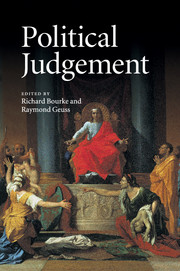Book contents
- Frontmatter
- Contents
- List of contributors
- Acknowledgements
- Introduction
- Part I The character of political judgement
- 1 What is political judgement?
- 2 Sticky judgement and the role of rhetoric
- 3 Theory and practice: the revolution in political judgement
- Part II Trust, judgement and consent
- Part III Rationality and judgement
- Part IV Democracy and modern political judgement
- Bibliography of the works of John Dunn
- Index
3 - Theory and practice: the revolution in political judgement
from Part I - The character of political judgement
Published online by Cambridge University Press: 26 December 2009
- Frontmatter
- Contents
- List of contributors
- Acknowledgements
- Introduction
- Part I The character of political judgement
- 1 What is political judgement?
- 2 Sticky judgement and the role of rhetoric
- 3 Theory and practice: the revolution in political judgement
- Part II Trust, judgement and consent
- Part III Rationality and judgement
- Part IV Democracy and modern political judgement
- Bibliography of the works of John Dunn
- Index
Summary
Introduction: enlightenment and revolution
The role of political judgement is a subject rich in confusion. The confusion is a product of antagonism. Distinct accounts of the relationship between political theory and practice reached a pitch of mutual antipathy during the aftermath of the French Revolution. Opposing philosophical positions became increasingly associated with rival political commitments as the experience of revolutionary turmoil deepened. A crucial matter in contention among competing political sects was the connection between enlightenment and politics itself. This question had been debated since the latter half of the seventeenth century in terms of the relationship between philosophy and government. How best to conceptualise this relationship was a matter of dispute giving rise to sharply divergent affiliations. Stipulating how judgement bridged the gap between theory and practice depended upon general assumptions about how philosophy should serve politics. Should it set out moral principles in terms of which existing political arrangements could be evaluated, or should it strive to predict the probable consequences of actions pursued under differing kinds of political system? The main advocates of the answers to these questions became ideologically polarised by the end of the eighteenth century. Divergence bred hostility; hostility brought confusion. The absence of current consensus on how political judgement should be understood is a product of this process of ideological struggle.
A twentieth-century historian turned philosopher once tried to erect a political theory on the assumption that any theory must subtract from the subtlety of practice.
- Type
- Chapter
- Information
- Political JudgementEssays for John Dunn, pp. 73 - 110Publisher: Cambridge University PressPrint publication year: 2009
- 6
- Cited by

